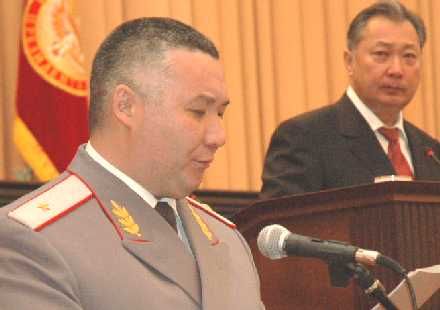
Kyrgyz Officials Seek Renewal of the Death Penalty
Publication: Eurasia Daily Monitor Volume: 6 Issue: 182
By:

The Secretary of the Kyrgyz Security Council Adakhan Madumarov and the Chairman of the National Security Service (SNB) Murat Sutalinov recently proposed legalizing capital punishment. Both officials reject standards promoted by Western organizations such as the Organization for Security and Cooperation in Europe (OSCE) (www.akipress.kg, September 23). According to both security officials, in the context of Kyrgyzstan, not only is capital punishment needed, but executions must be staged publicly.
The death sentence was abolished in Kyrgyzstan in the early 1990’s under the former President Askar Akayev. Recent discussions around reinstating the death penalty are reminiscent of a similarly outrageous proposal to legalize polygamy, which surfaced in the late 1990’s and more recently in 2007. Both represent a departure from democratic thinking in Kyrgyzstan and reveal the weakness of the NGO community. Although polygamy was never formally accepted by the Kyrgyz parliament, it set a precedent for politicians to renew debates about such change.
Local experts rushed to label this proposal as “abhorrent and disgusting.” According to this view, the proposal was designed to show that any dissent against the regime might lead to serious consequences. Kyrgyz experts believe that restoring the death sentence is aimed against opposition leaders, high profile criminals or religious extremists. Alongside this proposal, the Security Council has recently recommended that law-enforcement agencies should widen their list of religious extremist groups and include Tablighi Jamaat along with Hizb-ut-Tahrir. Religious extremists will thus be persecuted as criminals (www.akipress.kg, September 23).
In the past year several political opponents of the regime have fled Kyrgyzstan in order to escape pressure from the government. Most recently, a Member of Parliament from the opposition Social Democratic Party Bakyt Beshimov fled the country. His fellow party member Kubanychbek Kadyrov has also reportedly left after the local prosecutor stripped him of his political immunity.
The proposal also reflects the growing political leverage exercised by military and security officials in Kyrgyzstan. Madumarov, a self-proclaimed ideologue, also suggested improving the content of local television channels and reducing the amount of material depicting violence. Both high ranking security officials regard the death sentence as a means to combat political discontent. Local NGO’s have expressed concern with the proposition. The return of capital punishment, according to them, will be implemented without any additional reform of the judicial system, which is currently marred by corruption. Often criminals are released on bail, while innocent people fall victim to corrupt persecutors. Kyrgyz civil society views were published mostly by the foreign media, while Kyrgyz newspapers have increased their coverage of Islamic extremist movements in Kyrgyzstan (www.akipress.kg, September 23).
However, Madumarov and Sutalinov’s behavior suggests that they favor the death sentence. Abandoning the death sentence several years ago reportedly put greater material burden on Kyrgyz prisons. As Madumarov said while making his controversial proposal “why should society pay for people who commit crimes against them?” Meanwhile, Sutalinov promised that after 2-3 executions, the crime rate might fall (www.svpressa.ru, September 29).
Whether capital punishment will be legalized in Kyrgyzstan remains to be seen. Years after abandoning the death sentence, its status was finally fixed in the constitution in 2007. This was one of the major achievements of international organizations operating in Kyrgyzstan. As one former member of the Kyrgyz defense ministry told Jamestown, the West’s other important achievement was to place the penitentiary system under the ministry of justice, as opposed to the interior ministry. However, since then prison conditions have not improved and the rights of prisoners have also continued to deteriorate. The killing of the Member of Parliament Tynychbek Akmatbayev during a prison revolt in October 2006 was linked to this inefficient reform. Akmatbayev visited Bishkek prison to calm rioters, but the prison guards were unable to protect him from aggressive prisoners.
Opposing reforms facilitated by the West has become a popular trend among Kyrgyz politicians during the past few years. Resisting the influence of international organizations and instead following the “Kyrgyz” way now often appears to be their strongest argument. These tendencies resemble similar behavior among Russian political circles that see Western influence as disrupting local culture. Ironically, Madumarov uses the U.S. law on the death sentence as an example for Kyrgyzstan.
Patriotism and good behavior among the masses, in turn, is reinforced by the ruling party Ak Zhol. The party decided to make singing the national anthem mandatory for Kyrgyz citizens during national holidays (www.ferghana.ru, September 29). Kyrgyz citizens will have to sing the anthem standing with one hand placed on their chest. How this new rule will be enforced remains to be determined.




